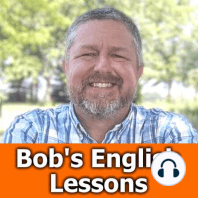4 min listen

Learn the English Phrases IT'S ON ME and THAT'S NEWS TO ME
Learn the English Phrases IT'S ON ME and THAT'S NEWS TO ME
ratings:
Length:
4 minutes
Released:
Apr 28, 2021
Format:
Podcast episode
Description
Read along to practice your English and to learn the English phrase IT'S ON ME and THAT'S NEWS TO MEIn this English lesson I wanted to help you learn the English phrase, it's on me. If someone says to you, it's on me, it means they're going to pay for something. Sometimes this happens when you go out to eat with someone and as you're getting out your wallet at the end of the meal, the other person might say, "No, no, don't worry about it. It's on me." When they say that, what they're mean, what they mean is that they're going to pay for your meal. It's awesome. People might even say this before you go out to eat or before you go do something I can say to my brother, "Hey, do you want to go see a movie tonight?" And if my brother was like, "I'm not sure." I could say, "Come on. It's on me." That means if we go to a movie, if I say, "It's on me," it means I'm going to pay for him. I don't usually ever do that, though. If my brother and I go see a movie, he pays for his own movie. I don't usually say, "It's on me." Sometimes when I go out to eat, I do though.WANT FREE ENGLISH LESSONS? GO TO YOUTUBE AND SEARCH, "BOB THE CANADIAN"✅If you enjoy these lessons please consider supporting me at: http://www.patreon.com/bobthecanadianHey, the other phrase I wanted to teach you today is the phrase that's news to me. When you say, "That's news to me," to someone it's usually after they've told you something that you didn't know about. If someone said to me, "Hey the hardware store in our local town is closing." I could say, "Oh really? That's news to me." What I mean when I say that is that I had not heard that before. If someone said, "Hey, did you hear," if my sister said to me, "Hey, did you hear mum sold her house?" I would be like, "What? That's news to me. I didn't even know she was planning to sell it." My mom hasn't sold her house, by the way. It's just an example.So to review, if someone invites you to go out to do something and it costs money and they say, "It's on me," it means they plan to pay for it. And if you are already out doing something and when you go to pay for it with your wallet, someone says, "No, no, it's on me." It means they're going to pay for you. That's kind of cool. And if someone says to you, "That's news to me," they're basically saying that whatever you just told them, they hadn't heard before. It's something new for them. It's news to them.Hey, let's look at a comment, though, from a previous video. This comment is from Sutopa and Sutopa says this, "Sir, can you explain last fall, late last fall. So in the previous lesson I referred to the season of fall by saying last fall and then I corrected myself to say late last fall. Here's my response Sutopa to explain that. Sure, last fall for us in Canada refers to the time from about mid September to mid December, the entire season of last year. So if I say last fall, I'm talking about the season of fall that we just experienced a few months ago. Late last fall would mean sometime in November or December of last year or the last part of the fall last year.So when I'm referring to the season of fall, I'm not just referring, when I say last fall, I'm referring to the entire season that occurred last year. When I say late last fall, I'm talking about the last few weeks of the season of fall. If I said early last fall, I would be referring to at the time of this video, September, October of 2020. But if say late last fall, I'm talking about the last part of the fall so end of November, beginning of December. I hope that made some sense.Support the show (https://www.patreon.com/bobthecanadian)
Released:
Apr 28, 2021
Format:
Podcast episode
Titles in the series (100)
Learn the English Phrases SPOILED BRAT and ROTTEN APPLE by Bob's Short English Lessons